

P21 Framework Definitions New Logo 2015. Framework for 21st Century Curriculum and Assessment. Updated February 2013 Adopted by the NCTE Executive Committee November 19, 2008 Context for NCTE’s 21st Century Literacies Framework.
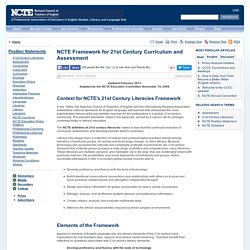
Information Literacy. Access and Evaluate Information Access information efficiently (time) and effectively (sources)Evaluate information critically and competentlyUse and Manage InformationUse information accurately and creatively for the issue or problem at handManage the flow of information from a wide variety of sourcesApply a fundamental understanding of the ethical/legal issues surrounding the access and use of information Additional resources: 1.
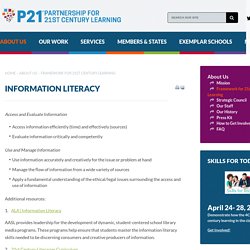
ALA | Information Literacy AASL provides leadership for the development of dynamic, student-centered school library media programs. 2. 21st Century Literacies Curriculum. Learning Standards & Program Guidelines. Review and Revision For the first time in decades AASL is using a multi-layered survey, data, and research approach to revise and remodel its learning standards and program guidelines for your profession.
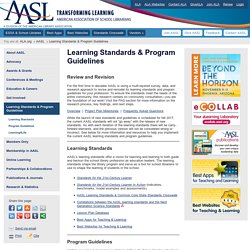
Coteaching: A Strategic Evidence-Based Practice for Collaborating School Librarians – School Library Connection Blog. Have you preregistered for Dr.
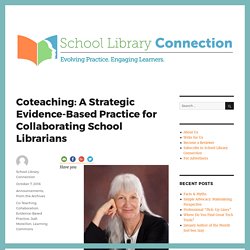
Judi Moreillon’s upcoming webinar on EdWeb, “Classroom-Library Coteaching 4Student Success“? Join Dr. Moreillon and our colleagues from Libraries Unlimited on October 13th at 5:00 PM EDT for an interactive exploration of strategies for identifying potential collaborative partners, electronic collaborative planning tools, providing evidence of the value and efficacy of classroom-library collaboration, and much more. Information Literacy Competency Standards for Higher Education. The Information Literacy Competency Standards for Higher Education (originally approved in 2000) were rescinded by the ACRL Board of Directors on June 25, 2016, at the 2016 ALA Annual Conference in Orlando, Florida, which means they are no longer in force.
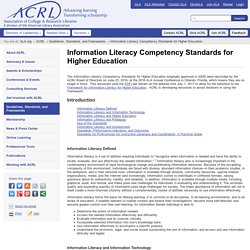
This document (and the PDF) will remain on the website until July 1, 2017 to allow for the transition to the Framework for Information Literacy for Higher Education. ACRL is developing resources to assist librarians in using the Framework. Introduction. Home - PA School Library Project - LibGuides at HSLC. “Supporting the Infrastructure Needs of 21st Century School Library Programs” is an Institute of Museum and Library Services (IMLS) grant-funded research project designed to provide new research on the impact of Pennsylvania school library programs on student learning—specifically, what infrastructure, defined as staffing, budgets, collections, technology, access hours, and professional development for librarians, contributes most to student achievementthe costs and benefits associated with them, and the gap between current Pennsylvania school library programs and what is needed to develop students with 21st century skills.
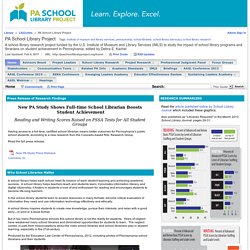
Additionally, the project will create communication tools, such as sample press releases, letters and editorials, and short podcasts and webinars that are easily understood by laypersons, that can be shared and used to develop partnerships among stakeholder groups beyond the traditional library community. Project Year: November 2011 - 2012. School Library Impact Studies. The Impact of School Librarians and Library Programs on Academic Achievement of Students: The South Carolina Study Keith’s latest research on the impact of school libraries and librarians was pursued on behalf of the South Carolina Association of School Librarians, who commissioned a 2014 study.
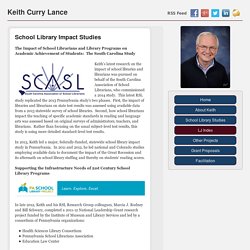
This latest RSL study replicated the 2013 Pennsylvania study’s two phases. First, the impact of libraries and librarians on state test results was assessed using available data from a 2013 statewide survey of school libraries. Second, how school librarians impact the teaching of specific academic standards in reading and language arts was assessed based on original surveys of administrators, teachers, and librarians. Rather than focusing on the usual subject-level test results, this study is using more detailed standard-level test results.
School Library Impact Studies Project. The first edition of this booklet was developed in by the Spring 2011 class of LSC 5530, School Library Advocacy, of the School Library & Information Technologies Graduate Program, Mansfield University, Mansfield, PA.
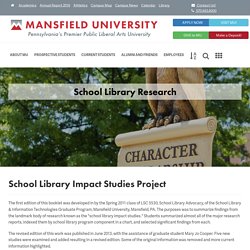
The purposes was to summarize findings from the landmark body of research known as the "school library impact studies. " Students summarized almost all of the major research reports, indexed them by school library program component in a chart, and selected significant findings from each. The revised edition of this work was published in June 2013, with the assistance of graduate student Mary Jo Cooper. Five new studies were examined and added resulting in a revised edition. School Libraries Impact Studies – Library Research Service. Library Research Service School Libraries & Student Achievement (2013) This 1-page infographic presents highlights from all of LRS’s school library impact studies.
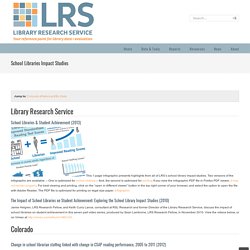
Two versions of the infographic are available: – One is optimized for online viewing – And, the second is optimized for printing If you view the infographic PDF file in Firefox PDF viewer, it may not render properly. Literacy Report Promotes Collaborative Teaching for 21st Century Learning. Home > Literacy Report Promotes Collaborative Teaching for 21st Century Learning April 5, 2013 By: Steve On April 3, the National Center for Literacy Education held a briefing on Capitol Hill to promote its latest report "Remodeling Literacy Learning: Making Room for What Works.
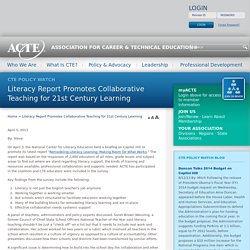
" NCLE Report: Remodeling Literacy Learning. Findings Key findings from the NCLE survey, explored in more detail in the body of the report, yield the following conclusions about how US educators are currently working together to meet rising literacy expectations and how best to support them going forward. Literacy is not just the English teacher's job anymore.
Working together is working smarter. But schools aren't structured to facilitate educators working together. Many of the building blocks for remodeling literacy learning are in place. Policy Recommendations.